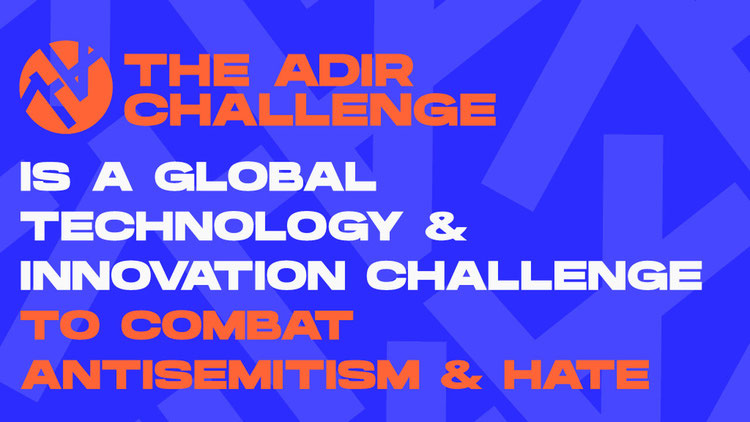Background
Hateful rhetoric and discriminatory incidents rooted in racism, sexism, xenophobia and other prejudices are on the rise globally, often amplified by the use of modern technologies, raising an immediate need for innovative high-tech solutions. While hate targeting any group poses dangers to society, antisemitism has been escalating and intensifying. The widespread propagation of antisemitic rhetoric and behaviors in our schools, universities and at all levels of government is well documented. Though foundational responses are vital, they have proven insufficient to counter the growing sophistication and pervasiveness of the threat.
For example, in the U.S., The Anti-Defamation League's data reveals a significant surge in antisemitic incidents during the three months following the October 7 attack on Israel. The organization tracked a total of 3,283 anti-Jewish incidents between October 7 and January 7, averaging nearly 34 incidents per day after the October 7 assault. This marks a staggering 360% increase in antisemitic incidents compared to the same period in 2022.
The challenges in combating this rise in hate include a lack of proactive measures leveraging technology, insufficient coordination among global responses, and the limitations of existing solutions in adapting and scaling to the evolving nature of hate and discrimination. These gaps highlight the necessity for a disruptive shift towards more dynamic, technology-driven strategies that can outpace the spread of antisemitic and other prejudice. We find ourselves at a critical juncture for cultivating breakthrough ideas to disrupt cycles of oppression.
At the same time, new technologies are evolving and maturing more rapidly than ever. Revolutionary advancements in artificial intelligence, big data, the internet of things, decentralized computing and others, are changing the world by the day. These technologies enable a whole new generation of products, services and paradigms in the high-tech industry. They hold a similar potential for disruption in every field, including the fight against hate.
Competitions have a long, rich history of catalyzing innovation across disciplines. Take the recent Vesuvius Challenge, where $1 million in prize money unlocked ancient secrets using AI, demonstrating competitions' immense power to spur breakthroughs. Unlike traditional funding models, competitions only pay for success, creating efficient incentives for unconventional thinking. This pull model draws ideas from the broader public rather than pushing developments through a closed system of investments and grants.
The ADIR Challenge Foundation
The ADIR Challenge Foundation (the “ADIR Foundation”) is a nonprofit charitable corporation established in response to current events, to develop dynamic initiatives using technology and collaboration to drive change. The ADIR Foundation’s principal activity in this regard is to develop and administer a worldwide innovation and technology challenge (the “ADIR Challenge”).
The goal of the ADIR Challenge is to foster an ecosystem of innovation, education, research and community building dedicated to combating hate. Participants in the ADIR Challenge, to be known as “Solvers,” will compete by creating innovative solutions to combat religious and other forms of hate and discrimination, with an initial focus on antisemitism.
The ADIR Challenge seeks to bridge the gaps in the fight against antisemitism, hate and discrimination by catalyzing a global movement that harnesses technology-based innovation to develop proactive solutions. The design is to produce winning ideas that can concretely operate top mitigate real-world hate. By tapping into the potential of disruptive technologies, the private sector and the enterprising spirit, the ADIR Challenge aims to foster a more systemic and coordinated approach. Through competitions, we aim to create a community that not only addresses the symptoms and complex root causes of hate and its enablers, but that creates effective means and sets a new standard for combating hate and discrimination.
The Ideation Competition
This Ideation Competition is the first step in developing and shaping the Challenge. Think big on what a large-scale competition could incentivize to drive tech-based and scientific solutions that address real-world antisemitism issues. We welcome ideas on:
- Key antisemitism problem areas where science/tech could provide solutions.
- Potential innovation topics/themes for new solutions.
- How you would leverage your passion for science/tech to drive change.
- What competition categories, criteria, incentives could excite innovators.
- Creative competition formats, partnerships, and judging approaches.
The ADIR Foundation intends to award three $10,000 cash prizes to the individual (or group) in each of three categories who develops and presents, in the sole judgment of the ADIR Foundation, the best idea or ideas that (i) could be used in, or (ii) could be useful in the design of, a technology-driven competition to develop strategies capable of making a significant difference in the fight against antisemitism and hate (i.e. the ADIR Challenge competition).
EACH of three winning entrants will receive (a) a $10,000 prize, and (b) automatically be qualified to compete for $1 million in the main ADIR Challenge competition.
Please see the Judging Criteria for more specifics about the judging and the selection criteria.
Submissions will be reviewed by a panel of judges selected by the ADIR Foundation, which will make recommendations for the award of prizes to the ADIR Foundation Board of Directors (the “Board of Directors” or the “Board”). Review and recommendations of submissions by the panel of judges will be made based on the Judging Criteria section above and the quality of the pitch video. Final decisions as to the selection of winners and the award of prizes shall be made by the Board, in its sole discretion. All submissions must comply with these Competition Rules and must be in keeping with the ADIR Foundation’s reputation and image. Any submission that does not meet this standard may be rejected in the sole discretion of the Board of Directors. In addition, the Board reserves the right, in its sole discretion, to award prizes, not to award prizes, and/or to cancel or modify this competition and any rules of this competition at any time.









